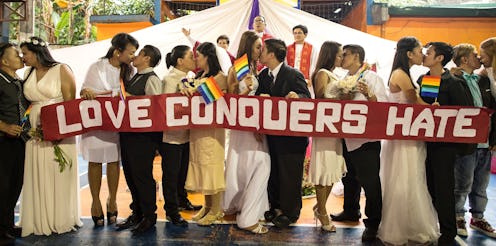News
The Philippines' Moves One Step Closer To Securing LGBTQ Equality After A Stunning Vote

Politicians in the Philippines achieved something that remains hard to believe even in places like the United States. Every single representative of the country's lower chamber voted in favor of a Philippines-wide LGBTQ anti-discrimination law, making the country one step closer to protecting its citizens from discrimination based on sexual orientation or gender identity. The vote came in at 198-0 with no abstentions. It's hard to believe the U.S. House of Representatives could achieve the same thing.
The vote was on the third and final reading of the bill, but that doesn't mean that it becomes law just yet. Now it moves to the Senate, and then it must be signed by the country's president, Rodrigo Duterte, who is not exactly known for his respect for human rights.
An earlier version of this same law, the Sexual Orientation and Gender Identity and Expression Equality bill, was previously held up by the country's upper chamber. In fact, the bill was first passed unanimously in the chamber in 2001, but then the Senate didn't move on the matter. It's languished until this year. The second reading passed just about a week ago, showing that the bill has really picked up momentum.
The good news, though, is that the new version is far better; it includes gender identity and expression for one thing. The one introduced more than a decade ago only touched on sexual orientation. If the current iteration were to become law, it would be a huge, positive change for LGBTQ people in the country. The law punishes discrimination with a fine of 500,000 to 1 million pesos and potential jail time. It also calls for gender-neutral toilets and sets up LGBTQ task forces at police stations across the country.
Lawmakers, including the Gabriela Women's Party, have framed the measure as an issue of basic fairness. "The proposed measure is the assertion of the LGBT community not for additional or special rights, but putting forward the recognition of same rights enjoyed by heterosexual individuals as stipulated in the law that are denied by individual and institutional practices," the party said in a statement.
Just last year, the Philippines elected its first transgender politician, Mashable reported. Geraldine Roman is also the highest elected LGBTQ official, a member of the lower chamber that voted on the bill Wednesday in Manila. She has been working on the anti-discrimination bill since taking her seat in the Philippines' congress. Exactly a year ago, she gave a speech saying, "It is the time to pass the Anti-Discrimination Bill on the Basis of Sexual Orientation and Gender Identity. And the time is now!"
Now she has words of celebration on her Facebook page:
I also want to thank the former "opponents" of the bill who are now on our side, and who now also wave the flag of Equality. Truly, we have shown that respect, humility, diplomacy, unity and the willingness to listen to one another, with neither judgement nor hubris, can work wonders.
The advancement of this law is a necessity given the precarious nature of LGBTQ acceptance in the country. The president, Duterte, had actually advocated for marriage equality before his presidential bid. But in March, he seemed to reverse course saying publicly that "there is the Civil Code, which says that you can only marry a woman for me… for a woman, to marry a man." Many saw this as a setback as it came during a rant about how Western values, including civil rights, were being forced upon the country.
Now is the time for the Philippines to move forward, not backward. There have been a number of hate crimes in recent years, with many transgender Filipinos being murdered. By moving to codify non-discrimination into the law, the Philippines may begin to change that. It's something the United States could consider following; there are currently no nationwide LGBTQ anti-discrimination protections on the books in America.